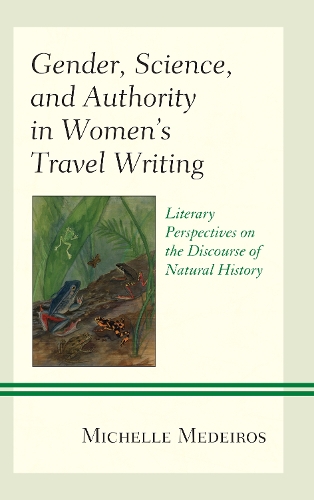
Gender, Science, and Authority in Womens Travel Writing: Literary Perspectives on the Discourse of Natural History
(Hardback)
Available Formats
Publishing Details
Gender, Science, and Authority in Womens Travel Writing: Literary Perspectives on the Discourse of Natural History
By (Author) Michelle Medeiros
Bloomsbury Publishing PLC
Lexington Books
15th April 2019
United States
Classifications
Professional and Scholarly
Non Fiction
History of the Americas
809.9332
Physical Properties
Hardback
222
Width 159mm, Height 232mm, Spine 21mm
549g
Description
Literary Perspectives on the Discourse of Natural History: Gender, Science and Authority in Womens Travel Writing analyzes the interrelations among authority, gender and the scientific discipline of natural history in the works of transatlantic women travelers from the nineteenth and early twentieth centuries. Michelle Medeiros sheds new light on our understanding of the literary perspectives of the discourse of natural history and how these viewpoints had a surprising impact in areas that went beyond scientific fields. This book advances the study of travel writing and gender in new directions by bringing together Latin American, European, and American women travelers who actively engaged in natural history discussions in their writings. By demonstrating how these women were only able to participate in intellectual enterprises by embarking on transatlantic voyages, this book discloses how the work produced by these travelers challenged and reshaped dominant discourses, bringing a new point of view to nineteenth and twentieth-centuries studies in Latin American history, literature, cultural studies, and history of science. Moreover, this book analyzes to what extent the approaches employed by female travel writers who wanted to engage in the production of knowledge has evolved in that time period, and to what degree such changes could be considered positive and more productive.
Reviews
Medeiros convincingly argues that the transatlantic traveling women discussed in this book were brave and strategic iconoclasts. By crossing geographical borders with their bodies, these women in turn broke social boundaries with their writing, opening up new textual and intellectual territories for other women to engage in debates about science, education, religion, and the natural world. Medeiros shows, too, how these writers powerfully spoke back to patriarchal, Eurocentric scientific writing practices that constructed the Americas as primitive and empty, and put both women and the Americas on the world stage as important producers of culture. That they did all this while appearing to adhere to social mores of their times makes their achievement all the more remarkable. -- Erika Behrisch Elce, Royal Military College of Canada
At last, we have a major contribution to the literature on women travelers--the focus of which is Hispanic women, who have too often been absent from other texts. It will certainly appear on my syllabi. -- Felicia Campbell, Editor of Popular Culture Review
Author Bio
Michelle Medeiros is assistant professor of Spanish at Marquette University.
